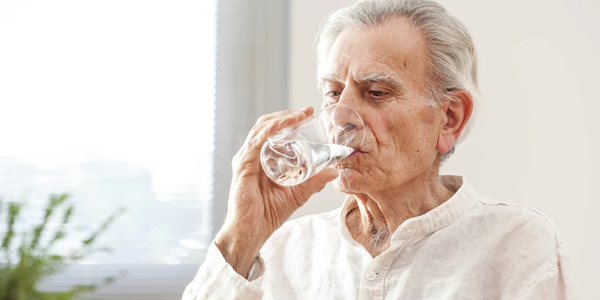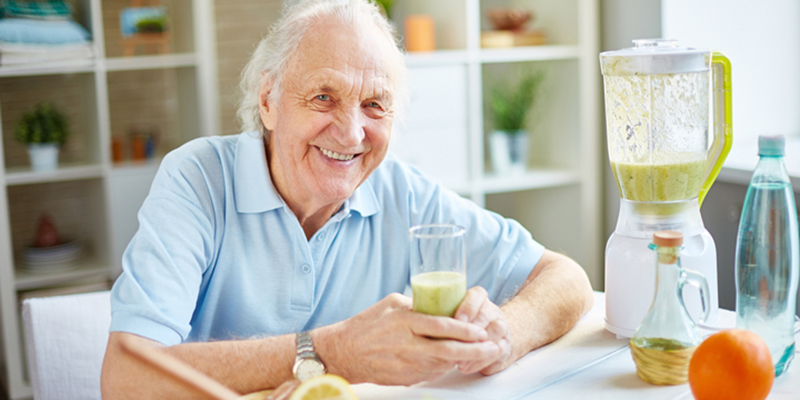Essential Hydration Tips For Older Adults' Health
The older we get, the more critical it is to scrutinize our diet since hydration remains an often overlooked criterion for maintaining good health. Staying hydrated begins with a good understanding of the relationship between diet and age, such as the fact that the human body is not as sensitive to thirst as it was in the past.
The older we get, the more critical it is to scrutinize our diet since hydration remains an often overlooked criterion for maintaining good health. Staying hydrated begins with a good understanding of the relationship between diet and age, such as the fact that the human body is not as sensitive to thirst as it was in the past.

Prolonged thirst not only affects older people's biological capabilities but also impacts their mental prowess, energy, and even the general condition of the joints. This is exacerbated even further for older adults due to the damage water deficiency can do when combined with all the other factors, such as headaches, reduced concentration, and dizziness. What might not be surprising is that most older adults' dehydration tends to result in hospital visits and, if left persistent, poses serious ailments such as kidney problems or infections like UTIs.
Changing The Paradigm
Here are some reasons why staying hydrated is a problem with ageing:
Reduced Thirst Perception: When dehydrated, our brains do not send strong signals asking for water, thus ignoring the need to drink.
Health Issues and Medications: The intake of diuretics along with diabetes can lead to accelerated water loss. Meanwhile, certain diseases make drinking water extremely difficult.
Physical Restriction: Reduced mobility or simply reaching for a glass becomes tedious.
Difficulties In Swallowing: Some older people suffer from dysphagia, which requires consuming a liquid with a thick consistency, reducing the amount of fluids taken.
Recognizing these roadblocks will allow individuals to manage and alter their daily routines.
Easy Tips To Improve Hydration
The most straightforward approach deals with minor issues that can lead to significant enhancement. Here are some simple strategies that can be effective.
Water Should Be Accessible: Keep a water bottle nearby at home or during outings. It will remind you to sip consistently throughout the day.
Schedule Alerts: Schedule an alarm or program a smartphone app to remind you to drink some water after every hour. This can be highly beneficial if your thirst cues are not where they used to be.
Combine Drinking with Other Activities: Try drinking at least a glass of water with every meal or when taking your medicines. Associating drinking with other routines could help implement a more structured approach to drinking water.
Water Should Be Flavored: If drinking water feels too monotonous, add vinegar, cucumber, or even a few berries. Instead of drinking plain water, infused water can have a better taste and, more importantly, make the whole process of drinking something more pleasant.
Add Water-Measured Solid Food: Consume fruits and vegetables that contain a high percentage of water. In addition to fluid intake, eating watermelon, oranges, cucumbers, or celery will help.
Choose the Right Drinkware: The design of your water glass or bottle may dictate how much you drink. Lightweight water bottles and cups with large grips make drinking easier if you have arthritis or other dexterity ailments.
Choosing The Correct Drinks
Water remains the best beverage for fluids, but other drinks can help maintain hydration, too. Here are some drinks that you should consider:
Coffee and Tea: Most traditional views suggest that coffee is very dehydrating, but moderate amounts of coffee or tea contribute to hydration. Just be mindful of the creams and sugars you add to it.
Avoid Sugary Drinks: While hydrating, fruit juices are not the best option due to their abundant sugar content, which is problematic for people with diabetes.
Consider Low Alcohol Options: Moderation is the key if you do consume alcohol through a glass of beer or wine, as it will not dehydrate you, but these drinks do not replace water entirely.
Smoothies and Milk: Smoothies serve a dual purpose as tasty and refreshing drinks, delivering nutrients and hydration when water is unavailable.

You should also remember that the amount and type of fluid you consume may differ if you suffer from certain illnesses, like kidney or heart problems. Discuss your specific requirements with your doctor to refine your hydration protocols.
Actionable Advice On Staying Hydrated Daily
Staying hydrated daily does not have to feel like an added chore or task. Below are some additional tips that may help you incorporate more fluid intake into your daily activities seamlessly:
Drink Before You’re Thirsty: Thirst may not be as intense as it was as we grew older, so people should aim to drink water regularly. A good practice is to take a few sips every 30 minutes, especially during active periods.
Utilize a Measurement Marked Water Bottle: Bottles equipped with measurements can help you track how much water you consume. They can also motivate you if you haven't consumed your daily water intake.
Develop a Water Drinking Schedule: Set specific times during the day to drink a good amount of water, such as first thing in the morning, when you consume a full glass, after breakfast, when you down another glass, and keeping one on hand during the afternoon and evening.
Socialize Around Fluids: Sharing a refreshing drink or cup of tea with friends or family is a cordial reminder to stay hydrated.
Mind the Weather: Pay extra attention to hot and dry weather conditions, as they increase your body's dehydration rate. Reduce outdoor activities without water on warmer days and increase your fluid intake.
Monitor Urine Color: Examining urine colour can be a useful, practical indicator of hydration levels. Urine colour that is pale straw indicates good hydration, while darker hues suggest the need for drinks.
Plan for Meals: Drinking a glass of water before a meal has the dual effect of aiding digestion, allowing quicker metabolism, and helping manage portion control, essential for maintaining weight.
Hydration: A Path To A Healthier Tomorrow
As mentioned before, remember that everyone's body comprises around sixty per cent water, and each sip is equally essential. Treat these tips as cues to lead a more healthy, active life. Cues like these could encourage you to take more steps towards vitality and lead a confident life.
With a few adjustments to your lifestyle, you could transform hydration from a dull task to one that promises many health benefits and builds a healthier-looking you.